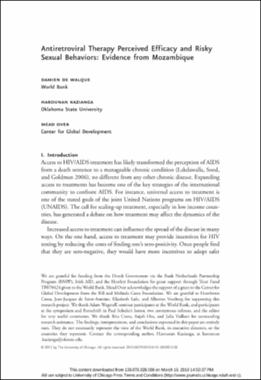| dc.contributor.author | de Walque, Damien | |
| dc.contributor.author | Kazianga, Harounan | |
| dc.contributor.author | Over, Mead | |
| dc.date.accessioned | 2019-08-22T17:50:45Z | |
| dc.date.available | 2019-08-22T17:50:45Z | |
| dc.date.issued | 2012-10 | |
| dc.identifier | oksd_dewalque_antiretroviralt_2012 | |
| dc.identifier.citation | de Walque, D., Kazianga, H., & Over, M. (2012). Antiretroviral therapy perceived efficacy and risky sexual behaviors: Evidence from Mozambique. Economic Development and Cultural Change, 61(1), 97-126. https://doi.org/10.1086/666951 | |
| dc.identifier.uri | https://hdl.handle.net/11244/321226 | |
| dc.description.abstract | This paper studies the effect of increased access to antiretroviral therapy (ART) for AIDS on self-reported risky sexual behavior, using data collected in Mozambique in 2007 and 2008. The survey sampled both households from randomly selected HIV positive individuals and comparison households from the general population. Controlling for unobserved individual characteristics, our findings support the hypothesis of disinhibition behaviors, in which people report more sexual risk taking when they perceive ART as more efficacious. In particular, risky behaviors are more positively associated with efficacious ART for family members of HIV positive persons and for individuals from comparison households. However, over the study period, we find that increased experience with ART at the nearest health facility has decreased, rather than increased, the perceived efficacy of ART. To the degree that the perceived efficacy of ART has declined, perhaps because people have known more patients who have failed treatment, people's sexual behavior has become more cautious. Our findings suggest that risk behavior is sensitive to the perceived efficacy of ART programs and that efforts to expand ART access or reduce ART failure rates must be supplemented with programs to prevent a resurgence of risky sexual behavior. We stress that our identification strategy reveals associations, and therefore our findings should not be interpreted as causal. | |
| dc.format | application/pdf | |
| dc.language | en_US | |
| dc.publisher | University of Chicago Press | |
| dc.rights | This material has been previously published. In the Oklahoma State University Library's institutional repository this version is made available through the open access principles and the terms of agreement/consent between the author(s) and the publisher. The permission policy on the use, reproduction or distribution of the material falls under fair use for educational, scholarship, and research purposes. Contact Digital Resources and Discovery Services at lib-dls@okstate.edu or 405-744-9161 for further information. | |
| dc.title | Antiretroviral therapy perceived efficacy and risky sexual behaviors: Evidence from Mozambique | |
| osu.filename | oksd_dewalque_antiretroviralt_2012.pdf | |
| dc.description.peerreview | Peer reviewed | |
| dc.identifier.doi | 10.1086/666951 | |
| dc.description.department | Economics | |
| dc.type.genre | Article | |
| dc.type.material | Text | |
| dc.subject.keywords | hiv/aids | |
| dc.subject.keywords | antiretroviral therapy (art) | |
| dc.subject.keywords | disinhibition | |
| dc.subject.keywords | mozambique | |
